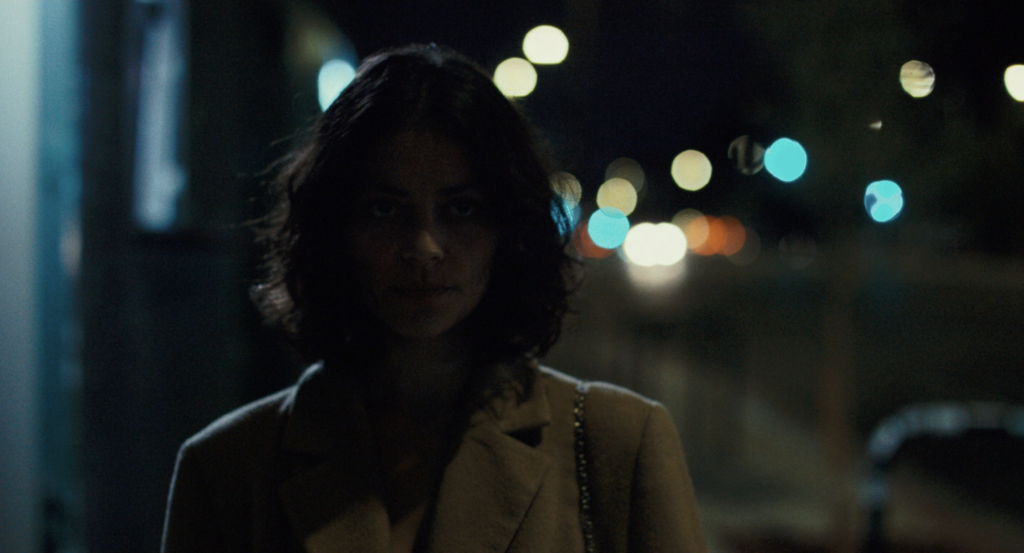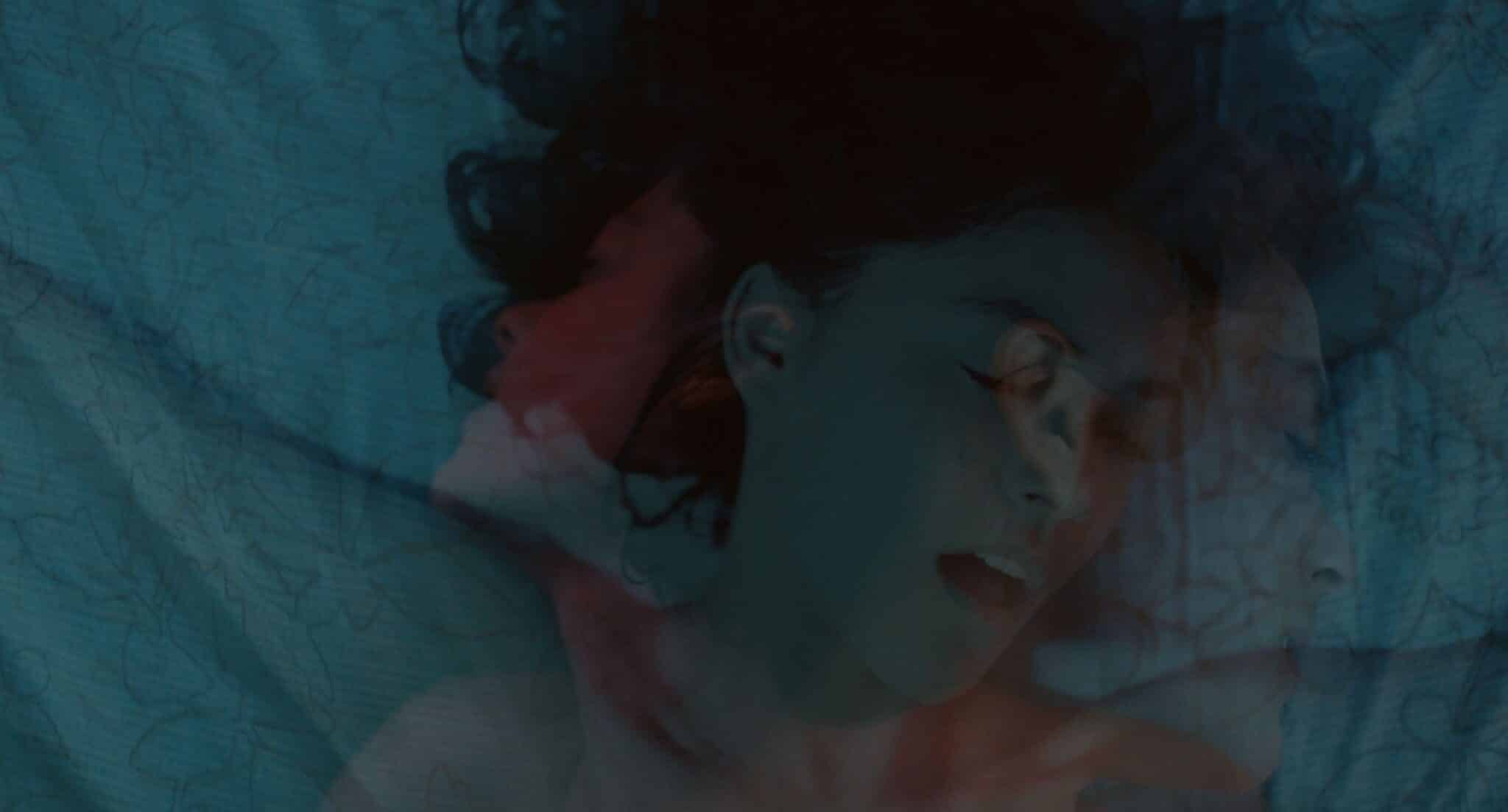
Could The Dead Thing (2024) have a simple strapline? If so, perhaps ‘this is hell we’re in’ would suffice, bearing in mind how – at least for the first couple of acts – modern technology is crucially important, and a key factor in raising a specific kind of hell. Today, there are all sorts of exciting opportunities for meaningless, short term connections and Alex (Blu Hunt) is all over them. For her, the tech-enabled gamut of swiping left or right on a dating app which isn’t Tinder, but kinda is, takes up a lot of her time. She actively avoids real-life connections, preferring to scroll, scroll, scroll, and often, to follow up the scrolling with a brief encounter. Perhaps she likes her encounters easy to manage, navigate and delete? Well, perhaps, but she doesn’t seem particularly happy in herself. She even seems to see people she engages with in real life as a sequence of body parts or attributes, each comparable with the last, so that one guy’s appearance recalls another, and another, and another. The ‘ping’ of notifications runs through all of her day-to-day. It looks like classic addictive behaviour.
If it is addictive, then this perhaps explains a dissatisfied, if brief rant about the nature of existence, including the proximity of a meaningless death – which pops out of nowhere on her next date, with a nice guy from the app called Kyle (Ben Smith-Petersen). Oh, nice to see House of Psychotic Women in the nightstand, by the way. If this conversation disrupts the norm for Alex, then so it does for Kyle, but it appears that her sudden honesty about her state of mind appeals to him. Or, in any case, they get a lot closer, enjoying the time they spend together. What we’re shown here seems very authentic, even heart-warming, given the clinical briefness of Alex’s prior dates. Sadly, it’s not that simple and after the intimate space they share, it appears that Kyle ghosts her. He doesn’t respond to her messages – he doesn’t even read them.
Hurt and surprised, she tries to track him down. When this fails, it looks for all the world as though she is just going to go back to the old, familiar business of bad dates and one night stands – except that, on her next date, she sees Kyle again. My god, he’s even turned up in the same bar where they met. Intrigued and not a little hurt, she follows him as he leaves with another woman. Or does she? When she tries to track him down again – wanting answers – someone at his old place of work hands her a funeral notice. So did she really see Kyle?
Objective reality which, let’s face it, always felt like it was going to be in short supply here, quickly begins to fracture as Alex seriously comes to doubt her senses. Perhaps doing the only thing she has any faith in, she resorts to the app again, and decides to try something. She uninstalls it, and then reinstalls: hey presto, there’s Kyle, and when she matches with him, he arrives for another date, with seemingly no recollection of meeting her before.
Whilst The Dead Thing grows increasingly thematically close to other films – it feels like somewhere between Nina Forever and Soulmate, if closer to the latter – then neither of those cover the same ground in such an eerie, meticulously detailed way. It’s an uncanny spin on a world starved of genuine connection, and more than that, it’s good at showing how the ways we understand and interpret death have been changed irrevocably by social media. People are gone, but there; they’re absent but present. At the heart of it all is Alex, and Blu Hunt does an incredible job conveying the world of barely-contained emotions she experiences, all sensitively directed by Elric Kane (and the intimacy coordination work here is very good too, responding carefully to the challenging world-building, and the absence, surrounding it). As circumstances grow weirder, we come to rely on Alex as our single point of relatability, as she is our only constant. That being said, it does feel tricky at some points, such as when she seemingly gives up on the mystery for a while, even if her willingness to go back to some sort of normality is understandable.
This is an interesting-looking film, too, which utilises an array of modern tech and its attendant preoccupations, but looks like something which could have been made decades previously. Its horror soundtrack, its framing, lighting, colour and shadow all look as though they could come from a different era. The ominous roar of traffic is 80s Fulci – as are the women in sexual peril, come to think of it, though The Dead Thing never focuses on the grisly details of bodily trauma and its supernaturalism never takes over, even as it grows to feel more familiar as we head into the final act. It’s much more about emotional ordeals, and it does deliver on those. And, as we explore these, we see that everything in The Dead Thing unfolds for us a mere version of reality. Nothing is anything more than ephemeral. Alex scans documents for a living – she literally makes copies. Her roommate hangs out in a wedding dress, when there’s no wedding. Reality is piecemeal, and something to be handled carefully, if not avoided altogether.
There’s plenty of space for horror in this kind of environment, and even as it settles into more expected tracks, the film has plenty of merit to offer in terms of its updated concepts of hauntings and bereavement. Many of its horrors may ultimately be age-old, but this parable of modern loneliness has more than enough brilliant, unsettling and resonant moments along the way. And, hey, perhaps we’re ready for this kind of limbo – the location for which almost, almost made me smile – and for the terrifying blackness pressing in on its edges, which didn’t make me smile once.
The Dead Thing (2024) featured at this year’s Fantasia International Film Festival.
